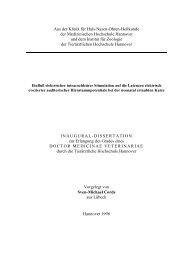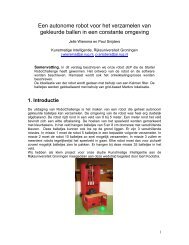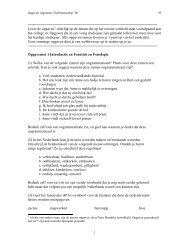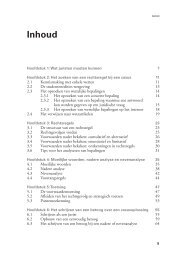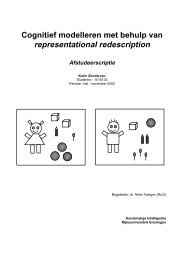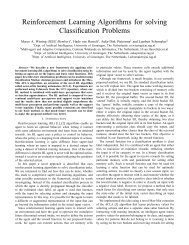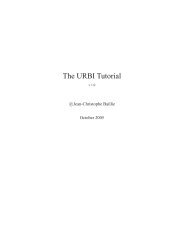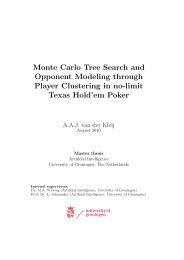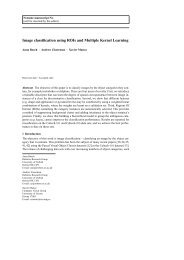Presuppositions in Spoken Discourse
Presuppositions in Spoken Discourse
Presuppositions in Spoken Discourse
You also want an ePaper? Increase the reach of your titles
YUMPU automatically turns print PDFs into web optimized ePapers that Google loves.
Between B<strong>in</strong>d<strong>in</strong>g and Accommodation<br />
and the discourse would seem to require mak<strong>in</strong>g several, if not all, of the<br />
connections identified. Consider the follow<strong>in</strong>g example:<br />
(16) (3-1a 117)<br />
Speaker A: I'm I was torn between . at the age of seventeen I was torn between<br />
modern languages and - and English - and I th<strong>in</strong>k really I was much<br />
more suited . to do<strong>in</strong>g English I mean I know lots of l<strong>in</strong>guists now and I<br />
realize A:[I never . cope with that] and I really prefer, I mean<br />
I'd far . much prefer to do B:[English*]. *~|<br />
Interviewer B *and do* you know . anyth<strong>in</strong>g about C:[the content {of an English<br />
honours course here}] .<br />
Speaker A Well I suppose it’s [@m] -<br />
Interviewer B Because you mentioned [@] that you know l<strong>in</strong>guists *and you* - felt<br />
that you couldn’t .<br />
Speaker A *( - coughs)*~|<br />
Interviewer B Do what they were do<strong>in</strong>g . ****~|<br />
Speaker A Well **I’m just** not <strong>in</strong>terested enough . really *. to do that*#|<br />
Interviewer B *and you know that* there’s a D:[l<strong>in</strong>guistic content] . **<strong>in</strong> what we<br />
do here*<br />
Speaker A **{yes} there certa<strong>in</strong>ly** is I know . I *know* I was sure that would be<br />
one of E:[the most difficult th<strong>in</strong>gs]<br />
Interviewer B **I see.<br />
In the above example, the def<strong>in</strong>ite NP, E:[the most difficult th<strong>in</strong>gs], is tagged as<br />
related by both annotators. The author identified C:[the content of an English<br />
honors course here] as the anchor, while the second annotator identified A:[I could<br />
never cope with that], specify<strong>in</strong>g that as referr<strong>in</strong>g to l<strong>in</strong>guistics. Neither of these<br />
anchors can be considered wrong. The speaker clearly <strong>in</strong>cludes l<strong>in</strong>guistics among<br />
difficult th<strong>in</strong>gs, l<strong>in</strong>guistics is part of the content of the course, and difficult th<strong>in</strong>gs<br />
are th<strong>in</strong>gs she cannot cope with. Additionally, the D:[l<strong>in</strong>guistic content] is what<br />
Speaker A <strong>in</strong>tends as part of the subset of E:[the most difficult th<strong>in</strong>gs], and all the<br />
difficult th<strong>in</strong>gs are th<strong>in</strong>gs relat<strong>in</strong>g to do<strong>in</strong>g B:[English]. Thus, <strong>in</strong> multiple ways<br />
E:[the most difficult th<strong>in</strong>gs] is related to many different <strong>in</strong>dividuals and ideas <strong>in</strong> the<br />
previous context, and additionally, failure to understand any of these relationships<br />
means one has not truly understood the mean<strong>in</strong>g of the text.<br />
The above example is not atypical, and often there is more than one<br />
l<strong>in</strong>guistic expression from which an anchor can be derived and that can be<br />
considered to license the use of the bridg<strong>in</strong>g NP. Hopefully it illustrates why<br />
annotation tasks for identify<strong>in</strong>g a unique anchor for a bridg<strong>in</strong>g NP will probably<br />
never achieve a high level of agreement. The example should show that current<br />
proposals for deal<strong>in</strong>g with bridg<strong>in</strong>g have perhaps too often limited themselves to<br />
the simpler examples.<br />
6.3.2 Not all theoretically possible l<strong>in</strong>ks are perceived<br />
The last section po<strong>in</strong>ted out some discrepancies between what is perceived by<br />
annotators and researchers and what current proposals predict would be found.<br />
171



